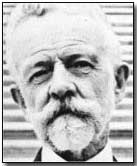Who's Who - Henry Cabot Lodge
 Henry Cabot Lodge (1850-1924), a
conservative Republican politician, proved a long-term adversary of
Democratic President Woodrow Wilson and, ultimately, his nemesis.
Henry Cabot Lodge (1850-1924), a
conservative Republican politician, proved a long-term adversary of
Democratic President Woodrow Wilson and, ultimately, his nemesis.
Born to a prominent Boston family on 12 May 1850, Lodge was educated at
Harvard from which he emerged with a Ph.D. in political science in 1876,
being admitted to the bar the same year.
Lodge acted as assistant editor, from 1873-76, of the North American
Review, before lecturing on U.S. history at Harvard from 1876-79.
He co-edited the International Review (with John Torrey Morse)
between 1880-81.
In 1880 Lodge was elected
to the state legislature (until 1881), and to the House of Representatives
in 1887 (until 1893). He subsequently served in the Senate from 1893
until his death in 1924.
Lodge took time to write a series of historical works and biographies in
addition to carving out a growing political career. His works included
biographies of Daniel Webster (1883) and George Washington (1889).
As a Senator Lodge formed a close alliance with Theodore Roosevelt.
Despite his reputation as a conservative Republican Lodge was by no means
isolationist. In favour of war with Spain in 1898, Lodge also favoured
the acquisition of the Philippines.
Lodge firmly believed that America deserved (and should therefore be
encouraged to develop) a prominent role in international diplomacy. In
order to achieve this he therefore argued for ongoing development of an
increased army and navy, military strength being a pre-requisite to
diplomatic power.
Conservative and conventional to the extent that he supported the gold
standard and protection, Lodge believed incoming 1912 President Woodrow
Wilson to be one of the more risky occupants of the Oval Office, with his
arch-progressive notions that were anathema to conservatives of Lodge's
slant.
Suspicious and contemptuous of Wilson's peace policies, Lodge welcomed U.S.
involvement in the First World War, while remaining (as chairman of the
Senate Committee on Foreign Relations) highly critical of Wilson's
prosecution of the war.
A bitter opponent of Wilson (the feeling was mutual), Lodge's position was
manifestly strengthened with the election of a Republican majority in the
November 1918 mid-term elections. With this election victory Lodge became
Senate Majority Leader.
Lodge used his powerful position
to oppose Wilson's plan for U.S.
participation in the
League of Nations. Proposing a series of
amendments to Wilson's bill ratifying U.S. entry into the League, Lodge
succeeded in watering down U.S. involvement while simultaneously encouraging
popular opposition to Wilson.
Wilson, ignoring the advice of his closest advisors (including
Colonel House) refused
to compromise with his Republican opponents; as a consequence Congress never
ratified U.S. entry into the League.
In 1920 Lodge was one of a number of Senators who proposed (and secured)
Warren G. Harding's nomination for the U.S. presidency.
Henry Cabot Lodge died on 9 November 1924 at the age of 74.
A howitzer is any short cannon that delivers its shells in a high trajectory. The word is derived from an old German word for "catapult".
- Did you know?
